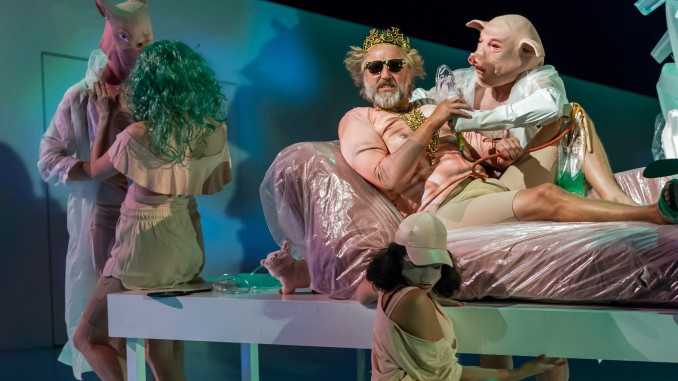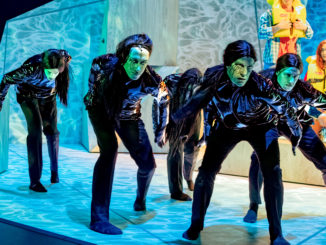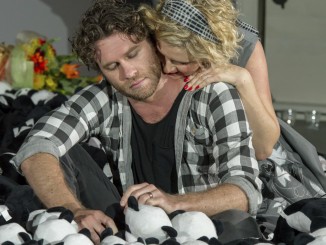
[Postmodern Stress Disorder]
In our over-saturated times where media of all forms is available in excess, the idea of originality becomes the ultimate predicament to the storyteller. There’s the notion that every story has already been told, all paths have been ventured, and nothing new can be said anymore. We live in an age where audiences are savvier than ever, consuming a never-ending supply of stories and information. Even the trope of acknowledging this very dilemma has been done to death.
This is tackled head on in playwright Eli Kent’s Peer Gynt [recycled], a translation/adaptation/deconstruction/bastardisation of the legendary Henrik Ibsen’s dramatic poem of the same name, by casting himself as one of the characters. Alongside director Colin McColl, the two have come together to expand on some of their favorite obsessions. With Kent, he continues to mine the existential crisis through meta-theatrical devices, as previously seen in All Your Wants and Needs Fulfilled Forever, and McColl returns to his career-long love of Ibsen.
It’s a much more successful fit than McColl’s last outing with modernising Ibsen’s A Doll’s House, where the naturalism of the Emily Perkins’ text was in opposition to the stylistic exuberance of his directorial choices. Here you can see him really let loose in a way that complements the writing, hungrily embracing the absurdist elements and non-linear structure. The resulting product is Auckland Theatre Company’s biggest and boldest production in a long time.
Kent takes a play about identity, using the title character’s own soul searching journey, to parallel his very own creative process and vice versa. We’re cleverly split between the world of the updated play and the world of Eli Kent attempting to update the play. But you don’t have to be a wandering traveller or award-winning playwright to relate to the crux of what Peer Gynt or Eli Kent want. Which is to find a sense of authenticity in a terrifyingly confusing time.
As someone with only fleeting familiarity to the original text, I never felt lost in the show, even at its most digressive. Because classics like Peer Gynt live in relative obscurity to the average theatregoer, they make an ideal textual corpse to be defiled. The Nordic myths and folklore that ground the original are filtered through Kent’s own personal pop culture obsessions, turning the play into a Millennial hall of mirrors. We watch as our titular hero ventures through a landscape filled with references to The Bachelor, Radiohead, Starbucks, James Cameron and Milo Yiannopoulos.
Even the design elements alone are enough reason to fall in love with the play, delivering on versatility and creativity in equal doses. The stark white minimalism of the stage is often filled with impeccable lighting and colourful costume designs that meet the challenge of every episode in the play. It’s an absolute triumph of design, servicing the text without being confined by it. While it’s only ATC’s second show in the still new Waterfront Theatre, they’ve already shown they can confidently make full use of what it has to offer.
The entire cast is also uniformly excellent, particularly Adam Gardiner who gleefully relishes his grotesque troll king and Peter Hayden as a snarky Ibsen. As Peer Gynt, Oscar Wilson and Jordan Mooney alternate the role, which is appropriate given the nature of both the character and the play, but the execution lacks consistency. While they both shine light on different aspects of the hero’s many faces, these differences often feel unnecessary and arbitrary. Wilson, whose performance introduces us to the character, brings a far more contemporary feel to his interpretation, from his modern dance moves and a more quintessentially Kiwi accent. The back and forth switching ends up feeling like a confused distancing effect rather than a purposeful addition to the existential themes of the play.
But the most compelling performance is Jack Buchanan as Eli Kent. That this performance is treated as a reality, rather than acknowledged as another fiction, feels significant in adding to the slipperiness of self in the play. If you’ve ever seen Kent on stage or even in passing, you’ll do a double-take. Aside from his chameleon-like ability to slip into Kent’s shoes, Buchanan also lends a nervous likability to the characterisation, portraying an individual at odds with his perceptions of himself, both as a person and artist.
At its most lazy, postmodernism and metatheatre can be used as the ultimate scapegoat to excuse flaws in structure and narrative. While this crutch isn’t overly abused, Kent’s own sexual anxieties and female problems are almost cheekily explained away without proper resolution. It works because it’s so self-aware, but it doesn’t change the fact that the story’s central female character storms off stage because it’s easier than giving her an actual purpose. The climax of the play, too, feels like a non-ending that explains the themes of the play in a whimper rather than living up to the theatrical energy supplied in the rest of the production. For all its unrestrained theatricality and imagination, the play ends up being trapped in its own head.
The closing moments of the play might not be satisfying, but they do reinforce and confirm one of the underlying messages of the text. Postmodernism isn’t enough.
Entertaining as well as elucidating, Peer Gynt [recycled] aims to be a messy masterpiece. Even if it’s lofty ambitions are compromised by its pacing problems in the second half and a lack of satisfying resolutions, it never feels anything less than epic.
Peer Gynt [recycled] played 7-18 March at the ASB Waterfront Theatre as part of the Auckland Festival. Details see ATC.
SEE ALSO: Metro Magazine review by James Wenley




Leave a Reply